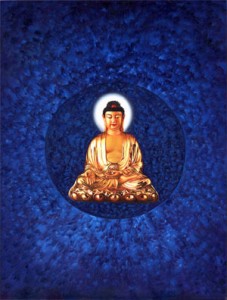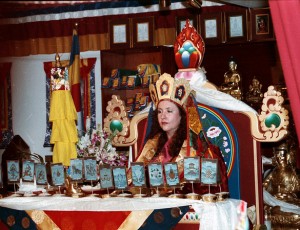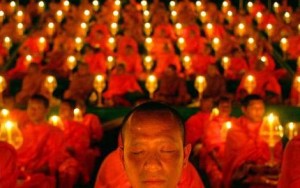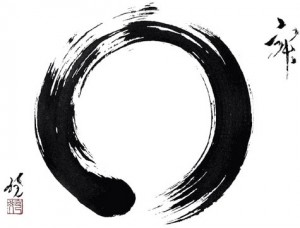An excerpt from a teaching by Jetsunma Ahkon Lhamo from the The Vow of Love series
In Buddhism, we explore the idea of suffering first. In that regard, Buddhism has been given a bad rap here in America. Many of the New Age philosophies support the idea that one should think only positive thoughts, and use affirmations. “Just resolve your conflict in a very loving way.” “Live a life that is free of conflict.” “Try to keep your mood elevated.” “Be happy all the time.” The idea, according to many of these systems, is that if you have happy thoughts and meditate on happiness all the time, you somehow will be happy all the time.
Buddhism has a different approach. We shouldn’t think that because it has a different approach, it has a different goal. Basically, according to the Buddha’s teaching, all sentient beings want to be happy. That is something that you have to understand before you do anything in the Buddhadharma. Before you do any kind of studying, you have to meditate on the fact that all sentient beings desire happiness. Because we don’t realize that. We forget. We tend to blame and judge and hate, because we forget that all sentient beings desire happiness, but they don’t know how to be happy. They don’t know how to create the causes for happiness.
This is not different from what New Age people think. They think that everyone has the right to be happy, and that we should try to be happy. But the Buddha’s approach is slightly different, and it goes something like this: all sentient beings desire happiness, but are constantly creating the causes of unhappiness. Witness this is so by the fact that everybody you know has periods of unhappiness, if not constant unhappiness. That being the case, we must be creating the causes of unhappiness. Unhappiness doesn’t come out of the clouds. It doesn’t manifest out of nowhere. It has a cause. There is a cause and effect for everything.
The approach, then, is to study suffering and how suffering comes about, as well as how all sentient beings essentially are suffering. We can’t understand how we create the causes of suffering, and we can’t understand what the antidote to suffering might be, if we don’t accept the fact that sentient beings are suffering. If we gloss over it, it gets away from us. The Buddhist approach to happiness is to study suffering in order to understand what the antidote might be. A Buddhist would say that if you go around saying affirmations and thinking positive thoughts all the time, perhaps it won’t work as well as you would like.
A New Age thinker believes the superficial level of conscious thought, and the resultant underlying thoughts, cause unhappiness. The Buddha, however, says what causes suffering and discomfort is something far beyond the level of thought, and therefore cannot be excised simply through moderating your thoughts. It can be modified by thought, but the root of the causes of suffering cannot be removed. One has to go much, much deeper than that. What actually causes suffering is the belief in self-nature as being inherently real. The belief in self-nature as being inherently real leads to clinging and desire, and it is desire that causes suffering.
Now, let’s say the New Age thinker might agree with this. He might say, “Yes, if you get attached to things, if you grasp onto things, they’ll cause suffering. I get that.” The difference is that the Buddha says you have to go really deeply into understanding the nature of mind, into realizing the nature of the emptiness of all phenomena, and the emptiness of self-nature, in order to excise that desire. You have to go much deeper than just ordinary thinking.
The reason I am inclined to believe what the Buddha taught is, first of all, he beat the game. That’s a really good sign, as far as I’m concerned. He beat the game and he attained supreme realization. Secondly, I know people who have adhered strictly, diligently, faithfully and loyally to New Age philosophy. If they get hit by a car, they will tell you it was fortunate, and they learned a great deal from it. That’s fine. I’m not going to argue. But two broken legs is not a good way to learn. Whatever happens to them, they just tend to gloss over it, and the problem is, they’re still suffering. They’re still suffering! My personal feeling is they’re in worse shape than they were before, because they have no means by which to get hold of the causes of their suffering. Whether they merely gloss things over, or force themselves to think in a certain way, they still get old, get sick and die. They are still helpless in the face of circumstances. I feel that it’s necessary to go deeper and to think in the way that the Buddha thinks.
What then is the cause of suffering? Why do circumstances appear as they do? Why are there old age, sickness and death? Why are there six realms of cyclic existence? All forms of life are impermanent. All of them experience some form of suffering. Animals certainly do. Animals grow old, get sick and they die. They get run over by cars. They get worms. They get mistreated. They get hooked up to yokes and made to pull carts and things like that. If you think that teaching animals to think positive is going to be the answer, good luck! I hope that you can do that, and I hope that you reincarnate again and again as a great Bodhisattva who can teach animals to think positive so that they won’t suffer anymore. But, it may not be possible. Like the suffering in the animal realm, we must think that there are other realms of existence where beings are also suffering.
Copyright © Jetsunma Ahkon Lhamo. All rights reserved





![brass_ring[1]](https://www.tibetanbuddhistaltar.org/wp-content/uploads/2010/10/brass_ring1-221x300.png)
![caterpillars_petite_tsingy[1]](https://www.tibetanbuddhistaltar.org/wp-content/uploads/2010/09/caterpillars_petite_tsingy1-300x225.jpg)


![CHENREZIG[1]](https://www.tibetanbuddhistaltar.org/wp-content/uploads/2010/09/CHENREZIG1-251x300.jpg)